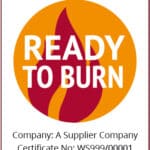New regulations for solid fuel came into force in England in May 2021.
They’re intended to help improve air quality and are called the Air Quality (Domestic Solid Fuels Standards) (England) Regulations 2020.
The changes affect retailers and suppliers of solid fuel, as well as consumers – for instance if you buy wood to heat your home.
Retailers/suppliers – what you need to know
Supply of wood in units of less than two cubic metres
If supplying wood in units of less than two cubic metres:
- It must be certified as Ready to Burn.
- You must not supply wood if after the issue of a certificate there is reason to believe that the moisture content of the wood amounts to the prohibited level, which is anything more than 20%.
- The wood must be supplied with the relevant information and the Schedule 1 logo.
Supply of wood in units of two cubic metres or more
If supplying wood in units of two cubic metres or more, it must be accompanied by a notice comprising the words in Schedule 2. This says:
“This wood is not suitable for burning until it has been dried. You should not burn wood until it has a moisture content of 20% or less.
“Wet wood contains moisture which creates smoke and harmful particulates when burnt. As well as being harmful to your health and the environment, this can damage your stove and chimney and is an inefficient way to heat your home. Dry it in a sunny, well-aired space for at least two years, keeping rain off in the winter.
“Radial cracks and bark that comes off easily suggests wood that is ready for burning. Test the wood when you think it is ready for burning, ideally with a moisture meter. First calibrate the meter and then measure a freshly split surface to get the best reading.”
This also applies to manufactured solid fuel, which is any solid fuel made from coal, wood, plant-derived materials, waxes or petroleum products, mixed with other ingredients. They must be certified for sale by HETAS.
Further information
- Business Companion – Sale of solid fuel and wood fuel.
- Contact us for tailored advice for your business.
Consumers – what you need to know
In the cost-of-living crisis, you may be thinking about using solid fuel to heat your home as a cheaper alternative to gas, electricity or oil. However, it’s important you know how to burn solid fuel in your home safely.
You should also be aware that unscrupulous traders may try to cash in on peoples’ need for warmth. Beware of offers that seem too good to be true. Read our consumer guide to solid fuel and wood fuel to find out how can you be sure you are getting the right quantity and that the fuel meets your expectations, as well as what you can do if things go wrong.
Unsuitable wood
Not all wood is suitable for use as a solid fuel. For example:
- Laburnum and yew are poisonous, so they are not recommended for cookers.
- Recovered wood can be used providing it has not been treated or painted.
- Chipboard, plywood and MDF shouldn’t be burnt because they contain chemical binders and adhesives.
- Painted or preserved timber due to the chemicals that may be present in the paint and preservative treatments, such as arsenic, copper and lead.
Why using dry wood is important
Firewood ready for burning should never contain more than 20% moisture. It is inefficient to burn logs that aren’t adequately seasoned (left to dry) because much of the heat produced as the wood burns will be required to drive off the moisture contained in the logs as steam.
It requires three times the number of unseasoned logs to produce the same amount of heat as well-seasoned or kiln-dried logs. The water vapour can combine with other gases that, unless a chimney is kept warm, form a creosote-like substance which hardens to form tar.
This residue is brown or black and can be flaky, sticky, runny, tar-like or hardened and will sometimes be all of these in the same flue. The chimney may become completely blocked or the volatile residue can ignite causing a dangerous chimney fire. Therefore it is important that you have your chimney swept regularly – see Devon & Somerset Fire & Rescue Service’s advice on chimneys, open fires and log burners.
To find a local chimney sweep, ask friends and family for recommendations. Or use Buy With Confidence (search for ‘chimney cleaning/services’) to find traders that are vetted and monitored by Trading Standards.
